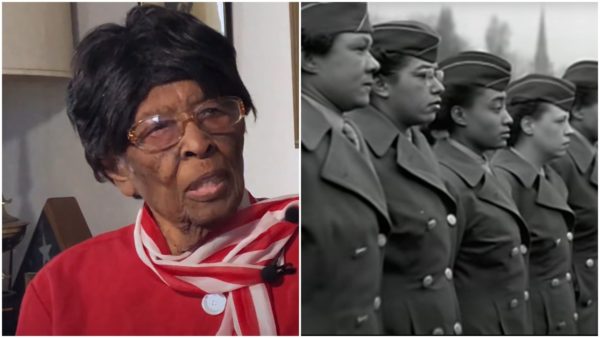Now that the Senate has passed legislation to honor members of the 6888th Central Postal Directory Battalion, Maj. Fannie Griffin McClendon is on track to receive the Congressional Gold Medal decades after her service in the United States Army during World War II.
McClendon is a retired member of the only Black battalion of women to serve in Europe during World War II. The battalion traveled overseas in 1945, was nicknamed “Six Triple Eight,” and has been credited with solving a wartime mail crisis. The battalion overcame encounters with German U-boats, an explosion, and sorted through packages stacked to the ceiling in unheated and rat-infested warehouses for months. The unit processed about 17 million pieces of mail, according to the National World War II Museum.
As members sorted through the undelivered mail for troops, government workers and Red Cross workers, they operated under the motto “No Mail, Low Morale.”

McClendon recalled, “They expected we were gonna be there about two or three months trying to get it straightened out. Well I think in about a month, in a month and a half, we had it all straightened out and going in the right direction.”
Members of of the unit in the Women’s Army Corps faced both racial and gender discrimination and had not received much recognition, although they ultimately set an example for future generations of Black women who would join the military and follow their legacy.
Army quarters were segregated along racial and gender lines and no commemorative services were held for the 855 service members when they returned home.
The bill that will pave the way for members of the battalion to be honored with the Congressional Gold Medal is awaiting action in the House. But for most members of the unit, the measure comes too late. Only seven members are believed to be alive, including McClendon.
“I just wish there were more people to, if it comes through, there were more people to celebrate it,” she said from her Arizona home. House representatives are working to get the bill passed and McClendon has met with her local congressman to press for its passage.
“It’s wonderful, and it’s time,” Stanley Earley III, son of late 6888th commander Lt. Col. Charity Adams Earley, told the Chicago Sun-Times. “It should have happened 50, 60 years ago. But there is now the opportunity for a recognition that these folks did all these things that were so important.”
Retired Army Col. Edna Cummings was not a member of the 6888th Battalion, but she has advocated for them to be recognized.
“It is sad to say. They came back to Jim Crow America,” Cummings said. “Not only the 6888th but a lot of our minority soldiers who returned from the war were not recognized or appreciated until years later. The Tuskegee Airmen, Montford Point Marines. There are so many stories of units of color who were not recognized until decades after the war.”
McClendon joined the Air Force after it was integrated and was the first female to command an all-male squadron with the Strategic Air Command.
At the age of 99, McClendon was interviewed by Arizona Representative Greg Stanton in 2019 and her perspectives were put on display at the Library of Congress as part of the Veterans History Project.
“It was to me history-making in that I learned geography and loved history in school — and to go to places I had read about or heard about, to me it just brought back things I had learned in school,” she recalled. “I still think about it even today.”


